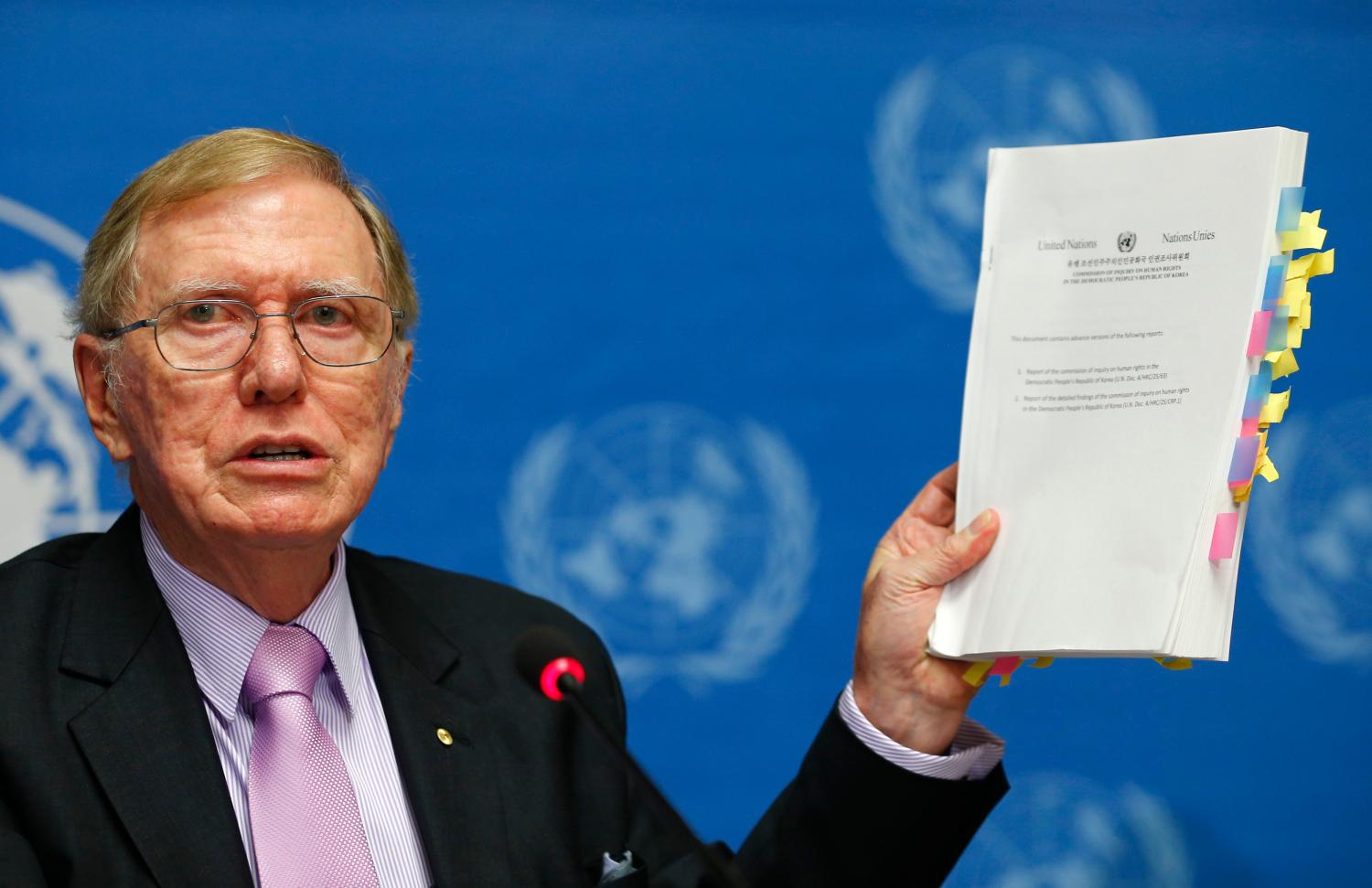Editor’s note: This book chapter on North Korea and the United Nations High Commissioner for Human Rights is part of the edited volume The United Nations High Commissioner for Human Rights, Conscience for the World (Brill |Nijhoff, 2014).
The Democratic People’s Republic of Korea (DPRK or North Korea), is best known internationally for its development of nuclear weapons and for the chronic hunger and malnutrition endured by much of its population. Less publicized have been its widespread and grave human rights violations, which North Korea has taken great pains to conceal. The country is by far the world’s most inaccessible and ‘most secretive,’ with its population often described as ‘the hidden people.’[1] Since 1948, the Kim dynasty has ruled North Korea with an ideology of nationalistic self-reliance (juche) effectively minimizing ties with much of the rest of the world. While there have been recent inroads into this closed society, North Koreans cannot exit their country freely, are not allowed to telephone outside the country or listen to radio broadcasts from abroad, and only a small number are allowed access to the internet.[2] Between North and South Korea today, “there is no telephone service…no postal service, no email.”[3] Foreigners allowed entry are limited in their ability to communicate with North Koreans. Even during the great famine of the mid 1990s when North Korea invited in international food agencies to counter starvation (at least one million reportedly died), it restricted the access and involvement of aid workers with the North Korean people.[4] Kim Jong Il, who in 1994 inherited the leadership of North Korea from his father Kim Il Sung, is quoted as saying, “We must envelop our environment in a dense fog to prevent our enemies from learning anything about us.”[5]
Origin of concern about human rights in North Korea
Largely because of the restrictions, inaccessibility and resulting lack of hard information, the first in-depth human rights report about North Korea was not published until 1988, 40 years after Kim Il Sung first assumed power. Two non-governmental organizations (NGOs) in the United States – the Minnesota Lawyers International Human Rights Committee and Asia Watch decided to bring to light whatever information they could find even though they could not visit and had to rely on unverified interviews and second hand reports. Their findings described draconian controls imposed on the population reinforced by regularized torture and summary executions.[6] Earlier in 1979, Amnesty International published the accounts of a Venezuelan and Frenchman detained in the North on political grounds from 1967 to 1974 and introduced North Korea’s political prison camp system to an international audience.[7] By 1991, Amnesty reported that, “Tens of thousands of people, including prisoners of conscience, appear to have been detained since the 1960s under various forms of arbitrary detention…. Thousands more appear to have been victims of ‘disappearances,’ torture or summary execution.”[8]
Neither the United Nations Division of Human Rights nor the UN Centre for Human Rights – the predecessors to the Office of the High Commissioner for Human Rights (OHCHR) – played a significant role in bringing to light the situation in the DPRK. To be sure, an expert body of the Commission – the Sub-Commission on Prevention of Discrimination and Protection of Minorities adopted a resolution on human rights in North Korea in 1997,[9] and the following year called on the Commission to take up the situation.[10] But it was not the High Commissioner or her staff that flagged the situation even though that Office took initiatives on other countries.[11] Rather, the Sub-Commission’s resolutions originated with the author of the1988 Minnesota Lawyers Committee report, David Weissbrodt, who became an expert member of the Sub-Commission from 1996 to 2003.
In 2003, the Commission on Human Rights for the first time adopted a resolution on North Korea and in 2004 appointed a Special Rapporteur to investigate and report on the human rights situation.[12] The 2003 resolution was the result of the efforts of NGOs and Western states, especially France, which was influenced by the publication in French in 2000 of a first-hand account by a North Korean survivor of a prison labor camp.[13] The resolution in 2004 appointing a Special Rapporteur was in part the initiative of the United States and its head of delegation Richard Williamson[14] as well as of the EU. Reinforcing the effort was a report submitted to the Commission by the OHCHR Secretariat summarizing UN activities on human rights in North Korea.[15] But the overall effort came from the outside, and even then these Commission resolutions were adopted more than 50 years after the Kim dynasty assumed power and 15 years after the first NGO report on the human rights situation.
UN treaty bodies, composed of independent experts and serviced by the Office of the High Commissioner, provided some help. As a result of its accession to four international human rights treaties,[16] the DPRK was obliged to submit reports every few years on its compliance to the expert bodies set up to monitor their implementation. Its reports, however, were mostly sparse and sometimes not forthcoming at all.[17] In fact, the Human Rights Committee observed in 2001 that 17 years had lapsed since the last dialogue with the DPRK and that the lack of information provided by North Korea made it difficult to address effectively “credible and substantiated allegations” brought to its attention by other sources.[18] The Committee nonetheless made extensive recommendations as did other treaty bodies and provided an information base that helped states draft the Sub-Commission and Commission resolutions.[19]
Notwithstanding this supporting role, the impetus for unearthing and publishing information about the human rights situation in North Korea and pressing states to take action came from non-governmental organizations, not the United Nations.
[1] See Ralph Hassig and Kongdan Oh, The Hidden People of North Korea: Everyday Life in the Hermit Kingdom (Lanham, MD: Rowman & Littlefield, 2009), 3-5.
[2] See UN General Assembly, Report of the UN Secretary-General, Situation of human rights in the DPRK, UN Doc. A/65/391, September 24, 2010, para.19; Hassig & Oh, The Hidden People; and Melanie Kirkpatrick, Escape from North Korea: The Untold Story of Asia’s Underground Railroad (New York: Encounter Books, 2012), 275-279.
[3] Barbara Demick, Nothing to Envy: Ordinary Lives in North Korea (New York: Spiegel & Grau, 2010), 10.
[4] See Andrew S. Natsios, The Great North Korean Famine (Washington, DC: US Institute of Peace Press, 2001), 5, 48-9, 140, 174-5, 215, 224.
[5] Demick, Northing to Envy, opening page.
[6] Minnesota Lawyers International Human Rights Committee and Asia Watch, Human Rights in the Democratic People’s Republic of Korea, 1988.
[7] David Hawk, The Hidden Gulag: The Lives and Voices of “Those Who are Sent to the Mountains,” 2nd ed. (Washington, DC: Committee for Human Rights in North Korea, 2012), 42-3.
[8] Amnesty International, “North Korea: Summary of Amnesty International’s concerns,” October 13, 1993. Amnesty International was allowed to pay a visit in 1991, the only time an international human rights NGO was allowed entry to North Korea.
[9] UN Sub-Commission on Prevention of Discrimination and Protection of Minorities, Resolution 1997/3, “Situation of human rights in the Democratic People’s Republic of Korea,” UN Doc. E/CN.4/1998/2, August 21, 1997, 18.
[10] UN Sub-Commission on Prevention of Discrimination and Protection of Minorities, Resolution 1998/2, August 19, 1998. The 1997 and 1998 resolutions cited reports of “mass internments” in detention centers, the deaths of “many” political prisoners, “frequent reports of extrajudicial execution and disappearances,” and “serious restrictions” on free movement. They expressed concern about the “virtual impossibility of obtaining information or visiting that country” and urged greater international attention to the problem so as to help North Korea’s population emerge “from the isolation in which it is maintained.”
[11] See Bertrand Ramcharan, A UN High Commissioner in Defense of Human Rights (Leiden: Brill, 2004), 12. The author reports initiatives that he undertook as Acting High Commissioner (August 2003- July 2004) on countries such as Liberia, Sudan (Darfur), Iraq and Ivory Coast.
[12] See UN Commission on Human Rights, Resolution 2003/10, “Situation of human rights in the Democratic People’s Republic of Korea,” UN Doc. E/CN.4/RES/2003/10, April 16, 2003; and UN Commission on Human Rights, Resolution 2004/13, “Situation of human rights in the Democratic People’s Republic of Korea,” E/CN.4/RES/2004/13, April 15, 2004.
[13] See Kang Chol-hwan and Pierre Rigoulot, The Aquariums of Pyongyang: Ten Years in the North Korean Gulag (Paris: Editions Robert Laffont, 2000) [in French], English trans. Yair Reiner (New York: Basic Books, 2001).
[14] Conversation of February 8, 2012 with Ambassador Richard Williamson, head of the US Delegation to the Commission on Human Rights in 2004. He pointed out that President George W. Bush read The Aquariums of Pyongyang, met with former North Korean prisoner Kang Chol-hwan and supported strong UN action on human rights in North Korea.
[15] See UN Commission on Human Rights, “Situation of human rights in the Democratic People’s Republic of Korea,” Note by the Secretariat, UN Doc. E/CN.4/2004/31, February 17, 2004; and Ramcharan, A UN High Commissioner, 100-101.
[16] North Korea is a party to the International Covenant on Civil and Political Rights, the International Covenant on Economic, Social and Cultural Rights, the Convention on the Rights of the Child and the Convention on the Elimination of All Forms of Discrimination against Women. See UN Treaties Collection, http://treaties.un.org/Pages/Treaties.aspx?id=4&subid=A&lang=en.
[17] See UN Commission on Human Rights, “Situation of human rights in the Democratic People’s Republic of Korea,” para.11.
[18] UN Human Rights Committee, “Concluding Observations of the Human Rights Committee: Democratic People’s Republic of Korea,” UN Doc. CCPR/CO/72/PRK, August 27, 2001, para.2.
[19] See UN Commission on Human Rights, “Situation of human rights in the Democratic People’s Republic of Korea,” para.11.



